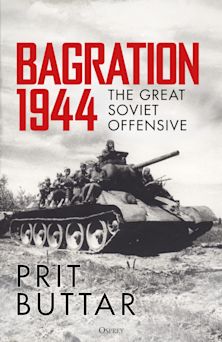- Home
- ACADEMIC
- History
- Second World War
- Why Germany Nearly Won
Why Germany Nearly Won
A New History of the Second World War in Europe
Why Germany Nearly Won
A New History of the Second World War in Europe
This product is usually dispatched within 3 days
- Delivery and returns info
-
Free US delivery on orders $35 or over
You must sign in to add this item to your wishlist. Please sign in or create an account
Description
Conventional wisdom explains German defeat during World War II as almost inevitable, primarily for reasons of Allied economic or military brute force created when Germany attacked the Soviet Union in 1941 and entered into a two-front war.
Why Germany Nearly Won: A New History of the Second World War in Europe challenges this conventional wisdom, highlighting how the re-establishment of the traditional German art of war—updated to accommodate new weapons systems—paved the way for Germany to forge a considerable military edge over its much larger rivals by playing to its qualitative strengths as a continental power. Ironically, these methodologies also created and exacerbated internal contradictions that undermined the very war machine they enabled and left it vulnerable to enemies with the capacity to adapt and build on potent military traditions of their own.
The book begins by examining the methods by which the German economy and military prepared for war and the military establishment's formidable strengths—plus weaknesses. Steven D. Mercatante then offers an entirely new perspective on the Second World War in Europe. He demonstrates how Germany, through its invasion of the Soviet Union, came within a hairsbreadth of cementing a European-based empire that would have allowed the Third Reich to challenge the Anglo-American alliance for global hegemony. This outcome, according to commonly cited measures of military potential, should have been completely out of Germany's reach. The author concludes by tracing the final years of the war and assessing how Germany was able to hang on far longer than expected against the world's most powerful nations working in concert to engineer its defeat.
Table of Contents
Chapter 1: The German War Machine on the Eve of War: Myth versus Reality
Chapter 2: The Third Reich Ascendant: The Reasons Why
Part II
Chapter 3: Comparing the World’s First Military Superpowers on the Eve of War
Chapter 4: History’s Bloodiest Conflict Begins
Chapter 5: An Inconvenient Decision Confronts Germany’s Masters of War
Chapter 6: Another Roll of the Dice
Chapter 7: Stalingrad in Context
Chapter 8: The European War’s Periphery
Chapter 9: Seizing the Initiative: The Sword versus the Shield
Part III
Chapter 10: A New Perspective for Explaining D-Day’s Outcome
Chapter 11: Hitler’s Greatest Defeat
Chapter 12: How the Third Reich Staved Off Total Defeat during the Summer of 1944
Chapter 13: End Game
Selected Bibliography
Product details
| Published | Jul 10 2014 |
|---|---|
| Format | Paperback |
| Edition | 1st |
| Extent | 426 |
| ISBN | 9781442236868 |
| Imprint | Rowman & Littlefield Publishers |
| Illustrations | 24 b/w illustrations; 34 tables |
| Dimensions | 9 x 6 inches |
| Publisher | Bloomsbury Publishing |
About the contributors
Reviews
-
Steven Mercatante makes a new and compelling case regarding how Nazi Germany lost the war. Written with verve, this book is a page-turner for anyone interested in how the Second World War unfolded.
The Historian
-
A thought-provoking book . . . [that] counter[s] widespread arguments that brute force was the main reason for success in World War II. . . . [Mercatante's] case deserves to be heard.
World War II Magazine
-
Recommended all levels/libraries . . . challenges conventional wisdom about Allied success in Europe...an impressive operational overview. . . . Mercatante sees Operation Barbarossa as a turning point, nearly leading to Hitler's hegemony in Europe.
Choice Reviews
-
Worth reading . . . much sound analysis . . . Mercatante . . . knows that the devil is in the details. To his credit, even those familiar with World War II scholarship will find here analyses of economic and technological matters that historians have often glossed over or mentioned only in passing.
Michigan War Studies Review



































